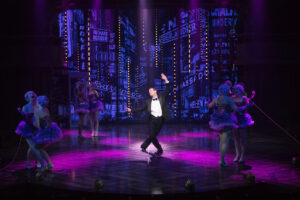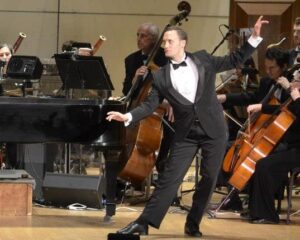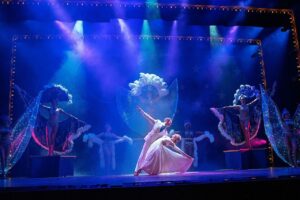Life in Step with Danny Gardner
Sunday September 29 | 3:00 PM
WCR CENTER FOR THE ARTS | 140 NORTH 5TH STREET
TICKETED EVENT | $30 ADULTS; $10 STUDENTS
Tickets can be purchased online here or during our in-person pre sales on September 8, 15, and 22 at Christ Episcopal Church and Trinity Lutheran Church.
 Soon after he began tap classes at the Marie Shaw School of Dance, Danny Gardner delivered his first lines onstage in the Reading High School production of “Mame.” From that time on, it seemed he was destined for Broadway, and sure enough, three decades later he is living in New York City, with three Broadway shows, five off-Broadway shows and a host of regional theater performances under his belt.
Soon after he began tap classes at the Marie Shaw School of Dance, Danny Gardner delivered his first lines onstage in the Reading High School production of “Mame.” From that time on, it seemed he was destined for Broadway, and sure enough, three decades later he is living in New York City, with three Broadway shows, five off-Broadway shows and a host of regional theater performances under his belt.
This program will reflect on a career that began as a way for Gardner’s parents, Donald and Maryann Gardner, to deal with their son’s bouncing-off-the-walls energy. When he was 6, they signed him up for an all-boys tap class taught by the late John Kalina, owner of the Marie Shaw School of Dance. Since then, Gardner has never stopped dancing. “I danced on the kitchen linoleum while my mother was cooking,” he said. She grew adept at dodging her little fireball.
 The Gardner family, which also included an older sister, Elizabeth (now Roan) and brother Ryan, were all devotees of music and theater. Maryann sang, Donald played guitar and accordion, and the whole family did high school musicals and community theater. When Ryan was a freshman at Reading High School, Danny, then 8, was cast in “Mame,” delivering its famous last line: “Life is a banquet and most poor sons-of-bitches are starving to death.”
The Gardner family, which also included an older sister, Elizabeth (now Roan) and brother Ryan, were all devotees of music and theater. Maryann sang, Donald played guitar and accordion, and the whole family did high school musicals and community theater. When Ryan was a freshman at Reading High School, Danny, then 8, was cast in “Mame,” delivering its famous last line: “Life is a banquet and most poor sons-of-bitches are starving to death.”
“I got to swear, and it got a big laugh,” Gardner said, explaining how he was instantly hooked on theater. As a teen, his first featured role included singing and tap dancing, as Tulsa in “Gypsy” at the Jewish Community Center in Reading. The more involved he became in local theater, the more he knew he wanted to go to New York and “try it for real.”
 After graduating from Reading High in 2001, Gardner majored in musical theater at Ithaca College, receiving his bachelor’s degree in 2005. He did a season of “real summer stock” at The REV in Auburn, N.Y., rehearsing the upcoming show during the day and performing the current one that night.
After graduating from Reading High in 2001, Gardner majored in musical theater at Ithaca College, receiving his bachelor’s degree in 2005. He did a season of “real summer stock” at The REV in Auburn, N.Y., rehearsing the upcoming show during the day and performing the current one that night.
After backpacking in Europe for a month, Gardner moved back to Reading, expecting to live at home for a while, work and raise money for a move to New York. He discovered that two of his theater friends were on a non-Equity tour of “42nd Street.”
“Mom said, ‘Why don’t you call Justin and Jenny and see if they need someone?’” Gardner said. “I said, ‘Mom, it doesn’t work that way.’”
But she persisted, and he finally called Justin, who told him to send a resume and photo, just in case, which he did. A few days later, Justin called and said the actor playing the lead role of Billy Lawlor had been fired. Gardner was hired for the rest of the tour.
 More roles came in regional theater, including “Genesius: The Musical,” by Michael O’Flaherty and Lawrence Fecho, at Genesius Theatre; “Crazy for You” at the Fulton Opera House; and “Singin’ in the Rain” at Goodspeed Musicals in East Haddam, Conn. After getting his Equity card at the Fulton, Gardner moved to New York, where he continued to pay his dues in regional theater while auditioning for Broadway shows.
More roles came in regional theater, including “Genesius: The Musical,” by Michael O’Flaherty and Lawrence Fecho, at Genesius Theatre; “Crazy for You” at the Fulton Opera House; and “Singin’ in the Rain” at Goodspeed Musicals in East Haddam, Conn. After getting his Equity card at the Fulton, Gardner moved to New York, where he continued to pay his dues in regional theater while auditioning for Broadway shows.
He got his first chance in 2011, when he was cast as an offstage swing for a production of “Funny Girl,” but the show never got off the ground due to four producers’ cold feet. Four years later, he was cast as Lucky in the 2015 Broadway revival of “Dames at Sea.”
The next year, he auditioned for the off-Broadway production of “Lady Be Good” at City Center, which featured one of his idols, Tommy Tune. The George Gershwin musical was Fred Astaire’s breakout show in 1924, and Gardner was cast in the same role, as Dick Trevor, opposite Patti Murin as the sister.
Also in 2016, he was part of the NY Spectacular at Radio City Music Hall, in which he played the statue of George M. Cohan come to life, along with the Rockettes. “For me, it was a peak experience,” Gardner said. “I was revealed as the statue, holding a cane, and for the first 45 seconds I just stood and looked out at the 6,000 seats of Radio City, and every night I got chills. I had a big solo, and I had the rare opportunity to dance with the Rockettes, who don’t normally dance with men. It was such an honor.”
In 2020, Gardner was assistant choreographer for a new show written and directed by James Lapine, with music by Tom Kitt, called “Flying Over Sunset,” a fictional story of Claire Booth Luce, Cary Grant and Aldous Huxley, and their experiences with LSD. Gardner was also understudying the role of Grant, played by Tom Yazbeck. But before he had a chance to perform, Covid-19 shut down Broadway.
Just before the lockdown, Gardner had met and was dating fellow actor Emily Larger; they met at a reading of the musical “Summer Stock.” They quarantined together, and have since married. The two of them later performed the roles of Christine Colgate and Freddy in “Dirty Rotten Scoundrels” at the Engeman Theater in Northport, N.Y. in 2023.
When Broadway reopened, Gardner finally was able to perform his big number in “Flying Over Sunset,” and in 2022, he was cast as The Spectre in “A Christmas Carol” at the Nederlander, also on Broadway.
As of May 14, he was preparing for a two-person new off-Broadway play, “The Opposite of Love,” by Ashley Griffin (who also plays the other role), scheduled to open May 28. “It’s a departure from what I usually do,” he said. “It’s a beautiful, very intimate show (no music and dance), and I’m excited to do a play.”
But Gardner has no intention of abandoning tap dancing, which he continues to perform, teach and choreograph. He loves it, he said, because “not only is it one of the only art forms that is truly American, but it also creates the music. We have a full drum set on our feet, with lots of shades and pitches and tones. When you choreograph, you try to find the melody of the percussion.
“But it also has a complicated history. At the beginning of my classes, I always acknowledge that the history of tap dance is based in Black American history. It’s a dear part of me, but it’s not my story to tell. I can only talk about my own history with it.” He will be sharing that history in September.
